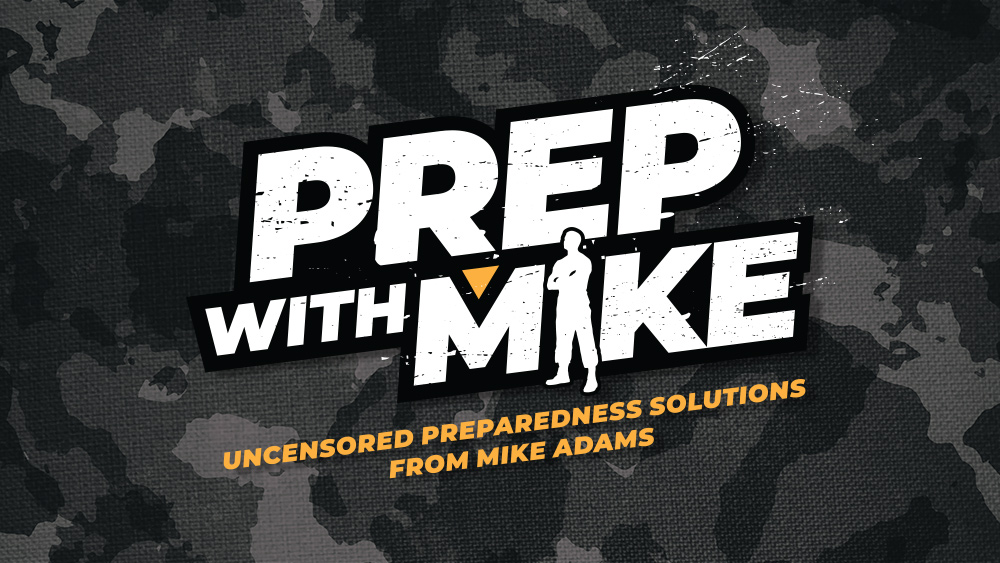
Advertisement
Many global events are converging toward a clash in 2018, but it’s also going to be a very positive year in many ways, too. To help you assess what’s likely to happen in 2018 and beyond, review these top predictions.
Remember, of course, that no list of predictions is 100% correct, but reviewing them should trigger you to consider these possibilities and plan accordingly.
#1) Domestic (short-term) economic boom in the USA, but long-term bubble implosions could be triggered at any time
The passage of the tax reform bill by the GOP will cause a massive influx of business capital into the United States as corporations are no longer strongly incentivized to offshore their domestic profits. This will spell huge gains in GDP growth (possibly even reaching 4.5% annualized GDP growth by the end of 2018), renewed job creation, plummeting unemployment rates, and so on. Expect to also see a drop in the number of Americans on food stamps and unemployment assistance. The federal treasury is also likely to see an increase in tax revenues, not a decrease, as more corporations decide to pay the 21% and keep their profits at home.
Despise this, the U.S. stock market remains wildly overvalued, as does the bond market, real estate market and cryptocurrency marketplace in general. Each of these markets is just one trigger event away from a cascading correction that could ripple through the system. My analysis, therefore, is that we are looking at an extremely polarized spread of likely outcomes for 2018 in terms of the markets. Either the markets are going to be very good, or very bad (due to a trigger event), with very little possibility of outcomes in between those two extremes. Make up your own mind about your personal finances, but my assessment continues to reach the conclusion that safekeeping your assets in land, gold and physical forms is the safest bet for the near future. (The world’s wealthy usually invest in gold, land and museum-quality art.)

#2) Military action involving North Korea
My analysis of converging events points to a very high likelihood of military action involving North Korea taking place in 2018, perhaps as early as the Spring of 2018. Several things are pointing us in this direction:
- The continued testing of nuclear warheads and ICBMs by North Korea, posing a legitimate threat to the world.
- The need for the military industrial complex to shore up public support for its existence and high funding levels.
- A popularity push by the Trump administration in advance of the 2018 mid-term elections (wars almost always make national leaders more popular).
There are, however, serious risks associated with any attack on North Korea. These risk include:
- The likelihood of mass casualties in Seoul, South Korea, due to retaliatory attacks by North Korea. Nearly all casualties would be innocent civilians.
- The likelihood of North Korea also attack major shipping ports for South Korea and Japan, causing severe, long-term global economic chaos and disruptions (would would be a “black swan” event that would reverse the market boom prediction No. 1, above).
- The wildcard possibility that North Korea successfully deploys a high-altitude EMP weapon against North America, plunging the nation into an all-out “Mad Max” collapse scenario, with an estimated 90% casualty rate of the U.S. population within the first year after such an event.
- The possibility that either North Korea or China could retaliate against the United States with an aggressive cyber warfare attack on U.S. infrastructure (see below for more details).
The best scenario in all this? The U.S. successfully carries out a “surgical” assault against North Korea to eliminate its leadership while disabling as many missile weapon systems as possible. Any casualty count under 100,000 innocent civilians should be considered a “success” in such a scenario, as Kim Jong-Un has promised to unleash artillery, short range and long range missile systems if attacked.
#3) FDA, DEA wage war on cannabis derivatives such as CBD oil (but their efforts fail)
With the blessing of Jeff Sessions, an anti-cannabis throwback to the days of “Refer Madness,” the FDA and DEA are likely to announce renewed efforts to criminalize CBD oil and other cannabis derivatives. These efforts, I predict, will ultimately fail due to the massive outcry by citizens as well as well-funded legal challenges by the cannabis industry.
The domestic cannabis industry has likely already surpassed $1 billion in annual revenues, and there’s plenty of money to fund legal challenges to restrictive regulatory assaults. In addition, the rising opioid crisis has created a humanitarian narrative for the availability of CBD oil, which is increasingly being used by soldiers and veterans as an alternative treatment for chronic pain.
The government cannot stop CBD at this point without a near-uprising across both consumers and private industry. CBD, it seems, will survive any efforts to subject it to prohibition. THC, on the other hand, will likely remain illegal at the federal level for many years to come, unless Trump himself intervenes and declares his support for nationwide decriminalization (which would be a brilliant strategy for his 2020 re-election).
#4) 2018 mid-term election results disappointing for Democrats
Barring some major game-changing event that results in President Trump resigning from office (not a likely outcome), the 2018 mid-term elections will prove disappointing to the Democrats because they won’t be able to gain control over both houses of Congress (as they currently hope). However, I do predict the following:
- Democrats are likely to gain some seats in both the House and the Senate (mostly in the House).
- There is a small but real possibility that Democrats could regain control of the Senate.
- I do not predict Democrats regaining control of both houses.
- This is all subject to change if bombshell if revelations come out in the months ahead, of course.
Other political predictions for 2018:
- The Republican investigations into the DNC / Clinton / Comey / Mueller deep state gain major traction. 2018 may be the year that deep state operatives actually get indicted for colluding to steal the election for Hillary.
- The UraniumOne investigation also makes major headway. But Hillary will likely never be charged, even if the truth comes out in full.
- President Trump gets one more SCOTUS nomination before the 2020 election, but this may not take place in 2018.
#5) Cyber attack!
2018 is the year we’re likely to start seeing large-scale cyber attacks carried out by nation states. There is already suspicion that the Atlanta Airport power outage was a “test run” for a cyber attack on the U.S. infrastructure, and it is will known that both North Korea and China possess highly capable cyber warfare operations.
For this reason, the most likely scenario that would initiate acts of cyber warfare is a U.S. attack on North Korea (see above). This attack could be met with a significant cyber warfare retaliation attempt by both North Korea and China, possibly with the technical assistance of Russia behind the scenes.
Keep in mind that the most likely targets of cyber attack are infrastructure centers in developed nations. In particular, water treatment facilities, nuclear power plants, oil refineries, airports and transportation systems are all prime targets. For this reason, all informed citizens should double down on their prepping in 2018 in order to be able to ride out a sustained outage of a critical infrastructure system (such as the power grid).
#6) Middle East tensions go into hyperdrive, with Biblical prophecy ever closer to playing out in Syria
The Trump administration’s recognition of Jerusalem as Israel’s capitol — something Obama, Bush and Clinton all promised to do, but never did — has predictably heightened tensions in the Middle East. This is the part of the world where events can go ballistic with startling speed and ferocity, so watch this area closely in 2018 – 2020. Some dynamics to consider:
- The Pentagon has ISIS on the run in Syria, now that President Trump has reversed many of the Obama-era policies that favored terrorist groups such as ISIS.
- Former U.S. President Barack Obama was a “sleeper cell” for Muslim extremists, and he handed Iran the funding and capabilities to develop nuclear weapons. Iran intends to use those nuclear weapons to destroy Israel and its allies. Obama is complicit in these activities, and it has already been learned that Obama ordered U.S. investigators to back off a Hezbollah terror group linked to Iran, allowing them to run cocaine trafficking operations on U.S. soil.
- Biblical prophecy from Revelation seems to be coalescing into astonishing accuracy, with many analysts of Biblical scripture believing a nuclear detonation takes place in Damascus, Syria, as Israel fends off a coordinated attack involving both Iran and Russia. The U.S. recognition of Jerusalem as Israel’s capitol, for example, checks off a box on the many events leading up to “Armageddon,” according to some analysts.
#7) More terrorism on U.S. soil (and more FBI cover-ups)
2018 will see new acts of terrorism on U.S. soil. Points to consider:
- The political Left in America will continue to deny the Muslim radicalization behind terrorism on U.S. soil, pretending that ISIS radicalization has nothing to do with the attacks. This denial will also, of course, be shared by the left-wing media.
- The FBI has lost nearly all credibility now, due to both the complicity of James Comey and Peter Strzok in the Clinton/deep state election operation, but also because the FBI was exposed as a wildly corrupt and even criminal operation in its handling of the Bundy Ranch prosecution and trial. (The trial has now been declared a mistrial, and some FBI operatives are probably facing their own criminal indictments in the near future.)
- Smaller acts of false flag left-wing terrorism will be carried out on U.S. soil to be blamed on “right-wing extremists” and “Trump supporters” in order to continue the Left’s delusional narrative of hate. These could include vehicle assaults or small explosives, sometimes masked as “hate crimes” against minority groups.
- Larger acts of domestic terrorism will be pursued by ISIS-linked operatives. These acts include large-scale shootings, large bombings and perhaps the deployment of an airborne dirty bomb, which requires nothing more than a Cessna, some old medical equipment and a simple chemical explosive mixture.
- The government will continue its cover-up of the Mandalay Bay / Las Vegas shooting, which has now been thoroughly exposed as a multi-person “team” operation involving at least one helicopter. ISIS has already claimed responsibility for the shooting, but no proof has yet emerged that the shooter had made the switch to radical Islam. (The corrupt FBI is also running this investigation, leading many to suspect the FBI knows this is ISIS terrorism but is covering up for ISIS, just as Obama did.)
#8) Cryptocurrency crackdown
2018 will be the year that central banks begin to fight back against the growing phenomenon of cryptocurrency. Manipulating the crypto markets is child’s play for the central banks, which will no doubt engineer a panic selloff or cyber attack on the blockchain as a means to destroy the credibility of crypto in the minds of the public. In addition, we should expect to see the following tactics unveiled:
- Mainstream media linking cryptocurrencies to acts of terrorism, human trafficking, money laundering and drug running.
- The linking of a major terrorism event (or false flag event) to Bitcoin as a way to start the process of criminalizing it.
- The eventual passing of a federal law that requires all cryptocurrency transactions to be linked to identities (this law may take several years to pass, but the narrative will be pushed heavily in 2018).
- The eventual roll out of an NSA-controlled crypto that also shares power with the central banks. We’ll call this “FedCoin” for now, but it might as well be called “NSAcoin.” Some people believe Bitcoin is already NSAcoin, and that it was introduced as a way to corral the masses into the virtual currency pillar of a totalitarian police state society.
- Remember: The establishment isn’t anti-crypto. They’re just “anti” anything they don’t control. They love the idea of crypto as long as they can track it, confiscate it and tax it. Their next big move is to discredit Bitcoin and shift people in to a crypto system they control.
#9) Secession gains steam surrounding 2020 election
This isn’t specifically for 2018, but the election outcomes of both 2020 and 2024 have a high likelihood of being trigger events for a surge of activity in secession movements in the United States:
- Should Trump win re-election in 2020, the California (Left Coast) secession effort will go into overdrive. Watch for a kind of political civil war in California as the rest of the state seeks to separate from the Left Coast, which has now devolved into a lawless welfare police state where the Governor (Brown) just pardoned violent criminals to protect them from being deported by the feds.
- Should a Democrat win the White House in 2020 or 2024, the inverse will occur: Texas will see a strong push for secession, possibly followed by Arizona, Louisiana and other states.
- Either way, the United States has become the Polarized States of America, where liberals and conservatives can barely coexist. This split isn’t strictly based on states, of course: It’s more about urban vs. rural philosophies, where people who live in cities tend to demand collectivism, communism and totalitarianism, while those in the country demand individual liberty and small government.
- In some ways, America is just one trigger event away from a civil war or armed revolt by the Left, which stupidly believes it can somehow defeat the millions of armed patriots across America, even when leftist protesters haven’t even learned how to cross the street without getting hit by a truck.
#10) The truth about food contamination and pesticide residues goes global with the Health Ranger’s food transparency project
This prediction is 100% certain, since we’re the ones launching it. In 2018, we will begin publishing reference charts showing the actual pesticides residues and heavy metals composition of popular off-the-shelf foods and supplements purchased from grocery stores and retailers. This is a world first, and it represents the start of a new era of food transparency where consumers can finally see exactly what’s in the foods, superfoods, and dietary supplements they’re eating. (I’m the author of the popular science book Food Forensics, which already published heavy metals numbers for 800+ foods, spices and supplements.)
I’ve been teasing about this project for a couple of years, but the kicker that got this off the launch pad was our recent acquisition of a new pesticide extraction automation system that processes 12 samples at a time using a cutting-edge solvent extraction technology. This effectively eliminates the worst bottleneck in all pesticide labs, which is “sample prep” or pesticide extraction. Most labs use an approach called QuEChERS, which involves a tremendous amount of time and labor, with lots of opportunities for mistakes by humans. This new solution that we’ve just acquired makes quechers obsolete while allowing us to batch process a dozen food samples simultaneously.
This is a game changer for the world of food science (and we are the first lab in North America to have this technology, by the way). Beginning next week, we start running mass spec acquisitions for off-the-shelf products with an aim of running wide-spectrum mass scans (up to 1700 Daltons) to build the world’s first “library” of the true chemical and elemental composition of off-the-shelf foods. Our goal is to compile results for 1,000 products by the end of 2018.
All the results will be openly shared with the public for free, under the non-profit Consumer Wellness Center. This is a world’s first, sort of like the Human Genome Project for foods. We are effectively “mapping” the chemical residues in food products, then making that information available to the public for free. (All results will be emailed out to GoodGopher mail users, which is a free, uncensored email inbox that cannot be blocked by Google, Facebook, YouTube or Twitter.)
You can stay informed about this project by reading Natural News or visiting the Consumer Wellness Center website.
In summary, be prepared for a tumultuous year in 2018. It can also be a year of great achievements and economic expansion, so take advantage of the opportunities while they last. At some point, the party is over for the debt-funded American empire, and we likely won’t be the “united” states of America for much longer.
Submit a correction >>
This article may contain statements that reflect the opinion of the author
Advertisement
Advertisements















